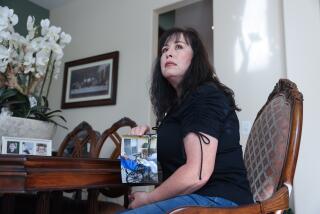Doctors May Testify About Peer Evaluations, State High Court Rules
- Share via
SAN FRANCISCO — The state Supreme Court, giving malpractice plaintiffs more ammunition in suits against hospitals, ruled Thursday that doctors who serve on committees that evaluate their peers may testify about fellow doctors.
Before the ruling, most lawyers assumed that the law, designed to ensure candor among doctors who evaluate their peers, was that peer review committee members could not testify in medical malpractice suits.
The court by a 4-3 vote upheld a statute saying that peer review committee members cannot be compelled to testify about discussions in the confidential meetings. But the court went on to rule that committee members can volunteer to testify against their peers.
May Prove Helpful
The ruling may help malpractice victims in suits that accuse hospitals of negligence for placing incompetent doctors on their staffs. The decision comes as malpractice lawyers with increasing regularity are suing hospitals for negligence over their selection of staff doctors. The trend began when a Court of Appeal in 1982 ruled that such suits could be brought.
Justice Allen Broussard, writing for the majority, said the aim of the statute’s requirement that peer committees’ discussions remain secret is aimed at improving medical care. However, Broussard said the prohibition against requiring testimony is enough to meet that goal.
“Extending the prohibition to voluntary testimony would further promote candor and frankness and would prevent recovery by additional plaintiffs,” Broussard wrote. “However, such extension is not essential to the promotion of the legislative purposes.”
Statute Analysis Urged
Broussard went on to say that the Legislature should analyze the statute to determine whether to prohibit voluntary testimony too.
Justice Edward A. Panelli, writing his first dissent since joining the court late last year, predicted that allowing even voluntary testimony will chill discussion in the committees.
“Few physicians will candidly participate or participate at all in a committee meeting if the confidentiality of that meeting can be breached at the whim of any person attending,” Panelli wrote in the dissent joined by Justices Malcolm M. Lucas and Joseph Grodin.
The case stemmed from a suit against West Covina Hospital for its decision to allow Dr. William D. McCowan to join its staff. McCowan, who has since died, operated on Terry Jo Tyus, then 13, for a stomach ailment, and removed much of her intestines.
Past Not Probed
The girl’s lawyers argued that the hospital did not properly investigate McCowan’s background and failed to find evidence of the doctor’s past problems. Over the hospital’s objections, the girl’s lawyers planned to call as a witness one peer review committee member, who apparently would aid their case.
In ruling that the doctor can testify, the Supreme Court reversed a Court of Appeal ruling that the member’s voluntary testimony was barred by the statute.
Arthur E. Schwimmer, one of Terry’s lawyers, said in hailing the ruling, “It will give the jury better insight into the actual workings of the peer review process. Since this cause of action is based on negligence of the hospital in selecting or retaining a physician, testimony by peers will occasionally establish that negligence.”
However, Ellis Horvitz, the hospital’s lawyer, said through a spokesman that the ruling may reduce the quality of medical care by allowing voluntary testimony of committee members.
“We’re concerned about anything that could weaken the peer review system, including anything that would discourage volunteer physicians from serving on these committees,” Horvitz said.
More to Read
Get the L.A. Times Politics newsletter
Deeply reported insights into legislation, politics and policy from Sacramento, Washington and beyond. In your inbox twice per week.
You may occasionally receive promotional content from the Los Angeles Times.










